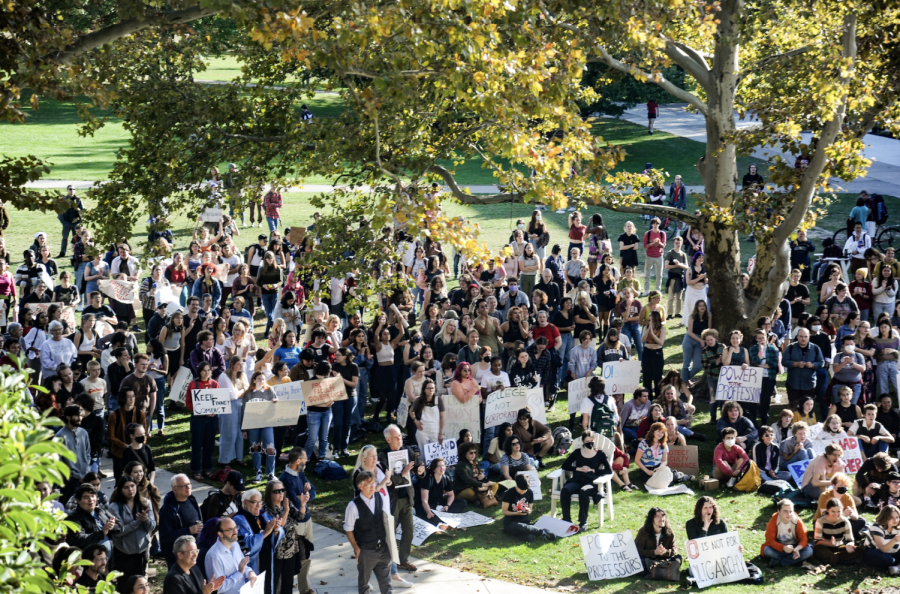Faculty, Students Organize Teach-In, Protest Ahead of Board Bylaw Vote
Editor’s note: The board voted to approve the amendments to the bylaws earlier today. They also made further adjustments to Article I of the bylaws, which can be found here.
Students, faculty, alumni, staff, and community members gathered in Wilder Bowl for a teach-in and protest on the Board of Trustees’ proposed changes to the College’s bylaws. Organized by faculty and Student Senate, the protest featured speeches by members of the campus community articulating the potential outcomes of approving the changes.
Under the revised bylaws, faculty would no longer have voting authority over nonacademic matters. Faculty were previously at liberty to introduce, deliberate, and vote on matters relating to the broad internal management of the College — these decisions would thereafter be subject to the guidance and approval of the Board of Trustees.
“The present bylaws state that the [General Faculty] are essentially in charge of the internal management governance of the College,” Assistant Professor and Chair of Art History Christina Neilson said. “And the new bylaws cut out any reference to [General Faculty] and replace it with a reference to the divisional faculty.”
Various sections of the Oberlin community spoke out against the proposed changes to the bylaws. Senate, faculty, and Oberlin College Office and Professional Employees union members all took turns speaking on their own experiences. The protest, while focused on the bylaws, also touched on different issues such as professor salaries, restrictions to reproductive health care, and recent austerity measures, such as the 2020 dissolution of the United Auto Workers union within the College.
“I feel like people are really angry and they want to see change happening at the school,” College third-year Anokha Venugopal said. “It’s an accumulation of a lot of different issues.”
Professors are concerned that without authority in the general management of the College, students’ overall experiences will suffer.
“It comes back to this idea of, ‘How are you gonna interpret academic matters at the moment,’” Neilson said. “We all know that academic matters could mean something beyond what goes on in the classroom, but what I’m worried about is in the future — could someone say the only thing that faculty should really be involved with is our curriculum and educational matters in a very narrow sense? … And how do you separate student wellness from student learning?”
Students raised the point that faculty consistently interact with students and hear about the issues they face.
“So many people are upset because faculty are the ones who are with us every day,” Student Senate Vice President and College second-year Natalie Dufour said. “They see us, they understand our struggles, and they know what we’re going through. The Board of Trustees [doesn’t] live here.”
Attendees watched as the trustees exited the Mudd Center to observe the protest. After speeches concluded, a student carrying a megaphone led a group of students to Mudd, where the crowd continued to chant as board members entered the Center for Engaged Liberal Arts for a meeting.
“It was just really inspiring to see,” Venugopal said. “When people started gathering around Mudd, that was crazy. It was so insane because I feel like I’ve never seen a protest while I’ve been here at Oberlin. It was just incredible.”
Protesters eventually decided to try to enter CELA and descended the interior staircase in an attempt to confront the trustees. They were met by Campus Safety officers and Dean of Students Karen Goff.
Goff then agreed to facilitate a meeting between a member of the board and the students in the stairwell. Chief of Staff David Hertz and Vice Chair of the Board of Trustees Lillie Edwards, OC ’75, entered the stairwell, where Edwards proceeded to answer students’ questions.
Students discussed a variety of concerns with Edwards, including the College’s investments and professors’ power to provide mental health resources. Edwards answered questions through a megaphone while other board members remained in CELA.
“I’ve had meetings with administrators who have assured me that nothing will change with these bylaws, and that … the bylaws are just naming what’s already going on in the College and just clarifying that for legal purposes,” Dufour said. “And while it makes sense to have more straightforward bylaws, it does not specify the role of the faculty in the new administration, which is why so many people are mad.”







